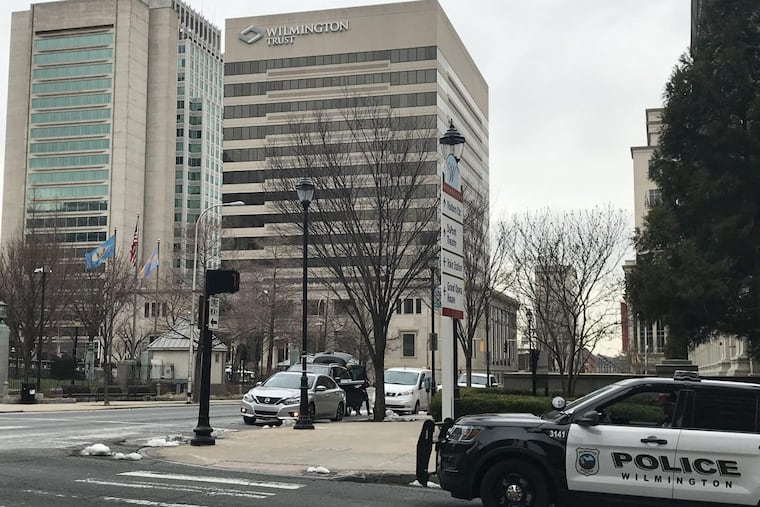Four Delaware bankers still free amid appeals, over a year after fraud convictions
Former Wilmington Trust Corp. President Robert V.A. Harra Jr. was convicted of fraud in May 2018 and sentenced to six years in federal prison in December, and ordered to report to serve his sentence in February.

It’s been a long time:
— Nine years after former Wilmington Trust Corp. president Robert Harra’s bank collapsed into a pit of bad developer loan write-downs;
— Four years after he and three top aides were indicted for lying to the Federal Reserve and the Securities and Exchange Commission;
— Fifteen months after they were convicted of conspiring to commit fraud by raising $600 million from hapless Wall Street investors and U.S. taxpayers while hiding hundreds of millions in “past due” bank loans whose disclosure finally forced Wilmington Trust out of business; and
— Seven months after they were sentenced to up to six years in prison -- among the longest sentences handed out to the 65 U.S. bankers and others convicted of bank fraud dating to the financial crisis of the late 2000s, federal officials said at the time.
Still, the convicted executives remain free on bail as the federal Appeals Court in Philadelphia reviews their lawyers’ 200-page attacks on the judge and jury that ordered them shut away from society.
The appeals boil down to two main points:
— Harra and his aides were only doing what the government let bankers do for years;
— Judge Richard Andrews let federal prosecutors under U.S. Attorney David Weiss try the men in front of a jury -- not for actual crimes -- but for wrecking the bank.
It was very expensive to shareholders (and to the 700 employees who lost their jobs, and more who lost their retirement savings), but it wasn’t actually illegal. So, the jury was wrong, too, according to the 23 lawyers, from Wilmington, New York, Philadelphia, Newark, N.J., and Washington, who are listed on the four appeals.
“For many years,” Wilmington Trust, “without objection from auditors or regulators,” didn’t list bad loans as “past due,” so long as the borrowers still paid interest and the bank was thinking about extending the loan terms, wrote Harra’s team of lawyers, led by Lawrence Lustberg at Gibbons P.C., Newark.
Prosecutors said that massive pile of late loans — which the bank’s own lenders called “turds,” according to trial testimony — were “past due” and said the bankers should have listed them as bad, before selling new securities in a bank they publicly claimed was still solvent, and accepting aid from the federal TARP bank bailout program.
But Harra “was not personally involved” in deciding whether to list those late loans, his lawyers claim in their appeal.
The lower-ranking bankers who did decide to follow old precedent and paper over those late loans reported — not to Harra — but to then-Wilmington Trust CEO and chairman Ted T. Cecala — who, as Harra’s lawyers pointedly note, was never charged.
Judge Andrews failed to tell the jury that prosecutors had to prove the loans really were, according to specific federal rules, “past due," Harra’s lawyers argued. They also accused the judge of repeatedly neglecting a “particularly powerful piece of evidence” — a document once published by the now-defunct federal Office of Thrift Supervision, which the defense said gave the bankers wide powers to decide which bad loans to list.
Judge Andrews’ “conduct of the trial [was] fundamentally unfair,” according to the Harra appeal, because it allowed Weiss’ prosecutors to present “vast amount of evidence” of “allegedly substandard banking practices” at the bank that “had nothing to do with the actual allegations in the Indictment.”
The lawyers all but admit Harra and his colleagues may have run Wilmington Trust into the ground:
The appeal recounts how the prosecutors accused the executives of running a “reckless sales culture” that kept making big loans to Delaware Shore developers even as Shore home sales dried up and other banks cut back in the late 2000s; of “inadequate underwriting” that led to reckless lending; of “improper loan oversight” that made it less likely the bank would collect loans that it made; and of “unjustified” leniency to borrowers — leading finally to the “collapse of the bank’s loan portfolio.”
And so what if they did, the appeal asks.
The government, the executives’ lawyers allege, failed to tie the bank’s collapse to the crime the bankers were charged with — their own failure to report hundreds of millions in late loans as it raised new cash from investors and the government.
By tying the banks’ collapse to its executives’ “greed and negligence," prosecutors were working on the jury’s presumed “bias" against bankers, Harra’s lawyers concluded. For all the people’s supposed hatred of bankers, Harra and his aides had influential defenders: Former Govs. Jack Markell, a Democrat, and Mike Castle, a Republican, asked Andrews for leniency, and religious leaders and other charities the bankers supported also begged the court to go easy.
The government is scheduled to defend its case and attempt to pull apart the appeals in its own brief next month.